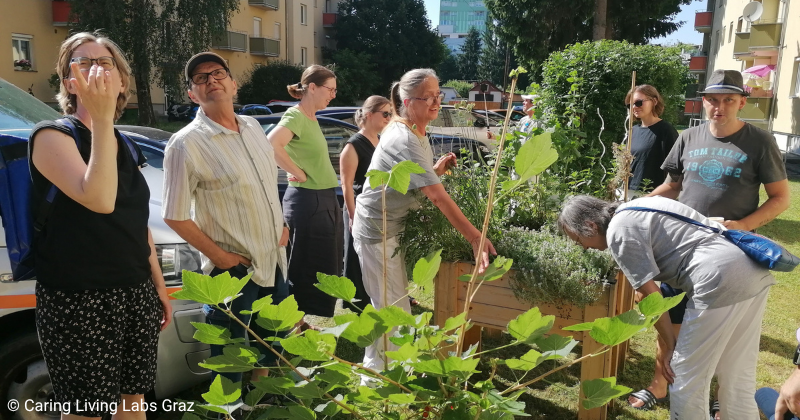Caring Living Labs Graz: Living Well in Old Age
Amid a changing world – where ageing populations and migration are transforming communities – a project in the city of Graz sought to answer a deceptively simple question: What does it mean to live well in old age?

This was the heart of “Caring Living Labs Graz,” a research and community education project that aimed not only to support older adults but to invite them into a conversation – as leaders, as neighbours, as citizens. The University of Graz, along with dedicated partners like the Migrant Advisory Board of Graz, the Peace Office Graz (“Friedensbüro”), and the OMEGA association (an NGO for supporting migrants), launched an initiative focused on those often left out of traditional education or support systems: older people with migration backgrounds and those in socially precarious situations.
The starting point was listening. The project began by gathering stories and perspectives from older adults across Graz – through interviews, group discussions, analysis of existing statistical data, and by joining them in everyday settings. The aim wasn’t just to collect data, but to understand real lives, real needs, and real hopes.
In one of the city’s community housing complexes, the project came to life in a tangible way. Workshops bloomed – spaces where residents came together to reflect on ageing, to share memories, to imagine better futures. These were no ordinary meetings; they were “philosophical storytelling cafés”, where laughter, debate, and deep thoughts mingled over coffee. Together, participants built raised garden beds in their courtyard, started regular social gatherings, and even launched a dance class. What had been just an idea – a caring community – began to take root in real friendships and shared actions.

Elsewhere in the city, workshops to engage especially with migrants’ communities opened broader conversations. Participants discussed not only personal journeys, but challenging topics like dementia – always with the aim of learning from each other and building empathy. These activities weren’t just meant to be support sessions – they were steps toward building a more inclusive city.
The project also aimed at bridging individual experiences, agency and support with a more structural level. Thus, four “Future Forums” brought together policymakers, NGOs, city workers, and residents to share insights and rethink how the city could better serve its ageing population – especially those shaped by migration. These gatherings also aimed at reflecting mindsets and at challenging stereotypes on ageing and migration.
Most importantly, the project didn’t treat its participants as people in need. It treated them as people with ideas, agency, experience and potential to care for others. As citizens who still have much to give – and much to say – about what a good life looks like, even in the later chapters.
Despite all the positive outcomes of the project, some challenges remained unresolved. Although many migrant citizens were successfully engaged, it was not always possible to include older adults with a migrant background in all activities to the extent we would have ideally wished. Structural asymmetries could be addressed, but not fundamentally changed within such a limited framework. The concrete structural and political effects of the future forums at the city level – beyond building new networks and raising awareness – cannot yet be clearly determined. A project-based funding period of two years has its limitations in terms of fostering sustainable change, but we believe that many valuable impulses have been set in motion.
In the end, Caring Living Labs Graz wasn’t just a research project. It was in many parts a living experiment in solidarity, in dignity, and in the belief that ageing and diversity can be embraced not as challenges, but as sources of strength.
For stories, images, and more about this journey, visit https://caring-graz.at
Key facts of the project:
Funding: „Caring Living Labs Graz: Gut leben im Alter“ (2022-2024) was funded by Fonds Gesundes Österreich and Gesundheitsförderung 21+.
Project Leader: University of Graz: Klaus Wegleitner - Center for Interdisciplinary Research on Aging and Care (CIRAC) and Annette Sprung - Department for Educational Science
Partner: Friedensbüro Graz – Peace Office (Heidi Bassin and Viktoria Fröhlich), Verein OMEGA (Virginia Argarate and Margareta Brigitzer), Migrants’ Council Graz (Godswill Eyawo), Sozialamt der Stadt Graz.
Projektteam: Anna-Christina Kainradl, Ulla Kriebernegg, Brigitte Kukovetz, Dzenana Pupic, Annette Sprung, Klaus Wegleitner




